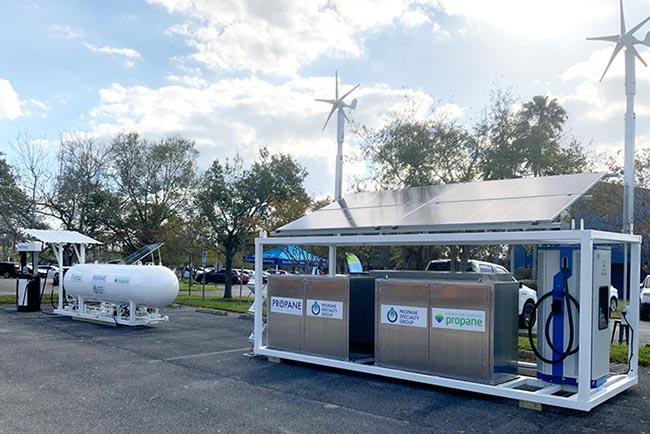 Newly released details on the Charging and Fueling Infrastructure Discretionary Grant Program provide an opportunity for communities to drastically reduce emissions. The released information highlights community access to clean transportation through investment in propane autogas refueling infrastructure or propane-powered recharging stations.
Newly released details on the Charging and Fueling Infrastructure Discretionary Grant Program provide an opportunity for communities to drastically reduce emissions. The released information highlights community access to clean transportation through investment in propane autogas refueling infrastructure or propane-powered recharging stations.
As part of the program, $700 million will be made available through grants, for publicly accessible fueling and charging infrastructure within a community, or projects, to support the nation’s alternative fuel corridors.
The program, which will award $2.5 billion over five years, will prioritize rural areas and low-to-moderate-income neighborhoods. As an affordable, portable, and available energy source, propane is an ideal solution for these prioritized categories.
“The goal of this program is to rapidly improve access to alternative fuel options and ensure energy equity by doing so in areas that have been historically underserved,” said Steve Whaley, director of autogas business development with the Propane Education & Research Council. “The fastest and most-cost effective way to achieve that goal is by implementing propane autogas refueling and propane-powered recharging infrastructure. Both options are affordable, available, and can accelerate our nation’s decarbonization and clean air efforts.”
For agencies interested in implementing solutions for medium-duty (class 3-7) fleets, propane autogas is an ideal choice with a range of up to 400 miles on a single refuel, the performance to carry heavier payloads, and the affordability to provide the lowest total cost of ownership. Not to mention, the cost to purchase and install refueling equipment for a fleet of medium-to-heavy-duty propane autogas vehicles is a small fraction of the cost to purchase and install fast charger equipment for charging a comparable electric vehicle fleet in a comparable time frame.
Agencies looking to maximize their investment can implement solutions that include options for various alternative fuel vehicles within the same infrastructure.
One example is the portable, dual-purpose, standalone fueling system from Propane Fueling Solutions, which can refuel propane autogas vehicles through a propane tank and dispenser. The system can also recharge EV fleets with DC level 3 fast chargers by utilizing a microgrid powered by a propane-based generator and renewable energy sources like wind and solar. The infrastructure provides a resilient and affordable charging option that operates independent of the grid.
In most cases, lead times for ordering this equipment are weeks, compared to months or years for other alternatives. Because it can be portable and installed in as little as 24 hours, it doesn’t require the same site prep, permanent housing, or other costly charges that are incurred with permanent infrastructure. This cuts costs by as much as 75 percent or more compared to traditional EV charging infrastructure.
“Whether agencies choose to implement propane autogas refueling stations or propane-powered recharging, the real winners here are the communities that benefit from the cleaner air,” said Whaley. “Today’s propane autogas engines reduce harmful nitrogen oxide (NOx) emissions by 94 percent, and propane-powered generators for light commercial microgrids are significantly cleaner than diesel with near-zero NOx and carbon monoxide emissions, as well as a 24 percent reduction in carbon dioxide emissions.”
Applications must be submitted electronically through grants.gov no later than 11:59 p.m. EST on May 30, 2023.

